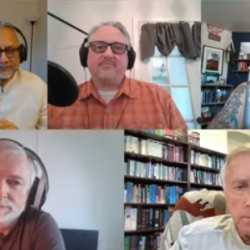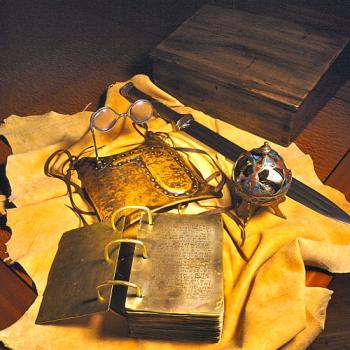Lectionary Reflections
Proper 13, Seventh Sunday after Pentecost
Matthew 14:13-21
July 31, 2011
The familiar story of the feeding of the five thousand is the only one of Jesus' miracles that is recounted in all four gospels. It appears in Mark 6:30-44, Luke 9:10-17, and John 6:1-14. There is also an account of Jesus feeding the four thousand in Matthew 15:32-39. The fourfold repetition of this story is a clue that it represents a memory near and dear to the heart of the early church. Apparently, they viewed it as a memory too important to ever be forgotten.
Matthew's account has the disciples respond in a matter-of-fact way to Jesus' command to give the people something to eat. They simply give a factual account of their limited provisions (Mt. 14:17). The accounts of this story in Mark, Luke, and John, emphasize, in varying ways, the sarcastic skepticism of the disciples (Mk. 6:37; Lk. 9:13; Jn. 6:7).
"Are we to go and buy two hundred denarii worth of bread, and give it to them to eat?" (Mk. 6:37)
"We have no more than five loaves and two fish—unless we are to go and buy food for all these people" (Lk. 9:13).
"Six months wages would not buy enough bread for each of them to get a little" (Jn. 6:7).
In Matthew, they simply report: "We have nothing here but five loaves and two fish" (Mt. 14:17).
To which Jesus responds "Bring them here to me."
So in Matthew the disciples raise fewer objections at the outset. They also seem to have a more active role in distributing the food to the people. In Mark and Luke, they "set (it) before the people." I picture them setting up the buffet table and covering it with the white paper that comes in those big rolls, cutting it to the right length and taping the corners so they don't blow in the wind. In John, Jesus himself distributes the food. But in Matthew, the picture seems to be of the disciples themselves moving through the crowds, distributing baskets of food to the hungry people.
Looking Back and Looking Ahead
So it would seem that, as we stand in the shoes of the disciples in Matthew's account, we are to obey Jesus' daring, ridiculous command. We are to offer our limited resources to him to bless and multiply, and take responsibility, not to hoard them for ourselves, but to distribute them to others. Resources could be money and possessions, but they also include time, energy, innate abilities, and acquired skills.
I mentioned at the outset that this account of the feeding of the multitude occurs four (actually five) times in the four gospels. It is recorded for future generations because we need to hear it over and over again too.
Why? Because over and over again in life, we stand in the shoes of the disciples in this passage: surrounded by human need, faced with a challenge, knowing we do not have the resources, in our own wisdom, wealth, and strength, to meet the need, to stand up to the challenge. With the disciples, we say, "This is a deserted place" (Mt.14:15). We sometimes feel our only option is to sit in our La-Z-Boy and try not to see the needs, to ignore the challenge. What other choice do we have? Because we do not have what it takes to meet them.
This story motivates us to get up out of our comfortable chairs and throw ourselves into offering our resources on behalf of a needy world. It calls us to remember and to anticipate. We are to stand in the story, looking back and looking forward, looking back to the manna in the wilderness and forward to the Lord's Supper. We are to stand, looking back, re-experiencing who God has been in the past. We are to stand looking ahead with faith in who God will be and what God will do in the future. This is the dynamic of anamnesis (active remembering) that undergirds participation in both the Passover and the Lord's Supper.
We are motivated to share our limited resources as we stand in the shoes of the skeptical disciples on the brink of a miracle. There we remember the manna in the wilderness. There the Israelites, newly escaped from bondage in Egypt (Ex. 16), feeling the pain of hunger in the pit of their stomachs, took refuge in fantasizing about their meals in Egypt. There God provided manna, nourishment in the desert.
We are also to remember the story of Elisha in 2 Kings 4:42-44.
A man came from Ba'alshalishah, bringing . . . twenty loaves of barley and fresh ears of grain in his sack. Elisha said "Give it to the people and let them eat." But his servant said, "How can I set this before a hundred people?" So he repeated, "Give it to the people and let them eat, for thus says the Lord, 'They shall eat and have some left.'" He set it before them; they ate, and had some left, according to the word of the Lord.





